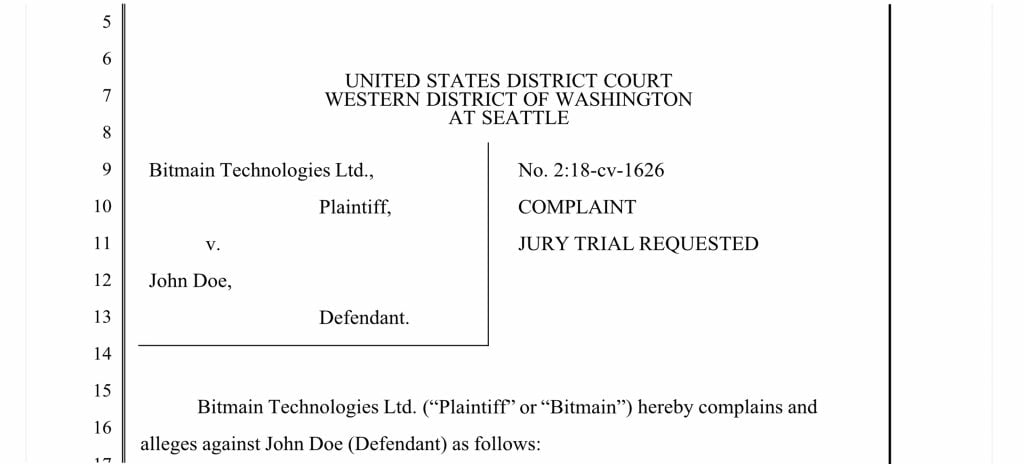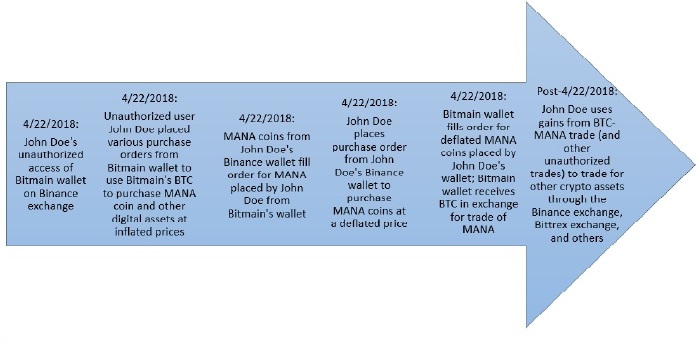Latest news about Bitcoin and all cryptocurrencies. Your daily crypto news habit.

According to court documents filed in Seattle, Washington, the mining rig manufacturer Bitmain has filed a lawsuit against an unidentified suspect who hacked the company’s Binance account. Bitmain hopes to identify the defendant “John Doe” and recover the stolen BTC siphoned from the organization’s cryptocurrency holdings held on the exchange.
Also Read: Fork Watch: List of BCH Services Providing Fork Support
Bitmain Files a Lawsuit in Seattle, Washington
 It seems Bitmain is currently suing an individual, but doesn’t know who the suspect is just yet. Right now, according to court documents, the company is in a “John Doe” lawsuit involving an unknown hacker and the cryptocurrency trading platforms Binance and Bittrex. According to the lawsuit filed by the litigation firm Perkins Coie LLP, Bitmain lost 617 BTC on April 22, 2018. This was when BTC/USD global spot market prices were approximately $8,935. At that time, the law firm believes, the hacker used the funds to inflate the prices of a lesser known cryptocurrency called decentraland (MANA) and pump and dump other smaller cryptocurrency markets.
It seems Bitmain is currently suing an individual, but doesn’t know who the suspect is just yet. Right now, according to court documents, the company is in a “John Doe” lawsuit involving an unknown hacker and the cryptocurrency trading platforms Binance and Bittrex. According to the lawsuit filed by the litigation firm Perkins Coie LLP, Bitmain lost 617 BTC on April 22, 2018. This was when BTC/USD global spot market prices were approximately $8,935. At that time, the law firm believes, the hacker used the funds to inflate the prices of a lesser known cryptocurrency called decentraland (MANA) and pump and dump other smaller cryptocurrency markets.
“Before the unauthorized trades on April 22, 2018, Bitmain’s digital wallet held approximately 890 BTC — After the unauthorized trades, Bitmain’s digital wallet had approximately 265 BTC,” the lawsuit explains.
After facilitating wash trades and pumping the coins with tiny market valuations, using both Bitmain’s account and his own Binance wallet, the hacker then sent the stolen funds to Bittrex in order to manipulate more markets. Bitmain’s lawyers state that Doe intentionally accessed a protected computer without authorization in order to defraud Bitmain’s custodial wallet on Binance. The court documents further state:
By means of such conduct, John Doe furthered the intended fraud and obtained things of value, specifically Bitcoin and other digital assets, causing a loss to Bitmain exceeding $5,500,000.
Using the Discovery Process to Uncover the Fictitious Defendant
Breaking international communications laws is the reason the court filing was processed in Washington. The law firm Perkins Coie believes the funds eventually landed in an account held on Bittrex, the Seattle-based trading platform. Doe’s unauthorized scheme to defraud was across state lines and was accomplished on the internet, which is used in interstate and foreign commerce and communications, the law firm emphasized. “[Doe’s] activities constitute a violation of the federal CFAA, 18 U.S.C.A. § 1030(a)(4),” the lawsuit further states. Perkins Coie details that Bitmain is entitled to damages under the CFAA Act and also wants to hold the suspect accountable.
It’s not unusual to sue a “John Doe” or “Jane Doe” in the United States as the suspect is known as a fictitious defendant. A Doe lawsuit or subpoena intends to uncover the identity of the fictitious defendant by using the courts to ultimately use the discovery process in order to uncover Doe’s name and location.
What do you think about Bitmain’s “John Doe” lawsuit in the state of Washington? Let us know what you think about this subject in the comments section below.
Images via Shutterstock, Bitmain, and the Washington state court documents.
At news.Bitcoin.com all comments containing links are automatically held up for moderation in the Disqus system. That means an editor has to take a look at the comment to approve it. This is due to the many, repetitive, spam and scam links people post under our articles. We do not censor any comment content based on politics or personal opinions. So, please be patient. Your comment will be published.
Disclaimer
The views and opinions expressed in this article are solely those of the authors and do not reflect the views of Bitcoin Insider. Every investment and trading move involves risk - this is especially true for cryptocurrencies given their volatility. We strongly advise our readers to conduct their own research when making a decision.

